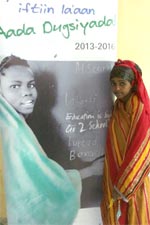Campaign to get one million Somali children into school

The launch took place yesterday, Sunday, 8 September - World Literacy Day - in Mogadishu, Garowe (Puntland) and Hargeisa (Somaliland). The campaign, supported by UNICEF and other international partners, will run for three years. It aims to give a quarter of the young people under 16 currently out of the education system a chance to learn either at primary school or through.
Enrolment rates in Somalia are among the lowest in the world. Only four out of every ten children are in school. Many children start primary school much later than the recommended school-entry age of six and many more drop out early. Secondary School education enrolments are even weaker and girls are particularly badly affected.
Building and renovation schools
The drive to get parents to bring their children to free Government schools will be boosted by plans to build and renovate schools across the country, train and support teachers, increase the capacity of Ministries and provide youth training facilities. The Initiative includes basic education for 6-13 year-olds as well as alternative basic education for out of school children including pastoralists and the internally displaced.
There are also plans for basic skills training for half a million 14-18 year-olds who are often seen as the age group most at risk of being recruited into armed groups or criminal gangs. However no funding has so far been pledged for this part of the initiative.
"Go 2 School is very ambitious, but it is an essential and achievable initiative," said UNICEF Somalia Representative, Sikander Khan. "Education is the key to the future of Somalia - we have already lost at least two generations. An educated youth is the best contribution to maintaining peace and security in Somalia that there is. I know the Somali parents recognise this and I believe that the international community does as well."
Sunday marks the start of the school year in South Central Somalia where enrolment figures due to continuing insecurity, conflict and displacement are lowest.
Crucial for maintaining peace
"Giving children and young people an education is crucial for their own future and that of their family and community. But education is also crucial for maintaining peace and stability. Education can be Somalia's true peace dividend," said the Somali Federal Government's Minister for Human Development and Public Resources, Dr Maryan Qasim.
In June this year, during the first Education Conference to take place in Mogadishu for two decades, Prime Minister Abdi Farah Shirdon, pledged that the Government would give education the same priority as defence and security.
The State Minister for Education in Somaliland, Ahmed Nur Fahuye expressed his full support for the Initiative saying: "We are all now required to teach or to learn."
Everyone must play their part
The Minister of Education for Puntland, Abdi Farah Said Juxa, said, "Our children must come first. We all need to come together and help educate our children. Everyone must play their part, government, parents, teachers and the community at large. Education is our future. The efforts we put in today will be rewarded tomorrow."
Local businesses, politicians, religious leaders and elders have all pledged support for the campaign. The Somali Diaspora is also engaged with award winning novelist Nuruddin Farah and supermodel Iman both urging support for the Initiative.
The Go 2 School Initiative, which will cost $117 million over three years, is being supported by UNICEF, WFP and UNESCO along with a number of International NGOs. Funds from the European Union, USAID and the UK's Department for International Development DFID have been granted to a consortium of NGOs. Japan, the Global Partnership for Education and the Danish International Development Agency DANIDA, have made commitments whilst others such as Educate a Child and the Islamic Development Bank have expressed interest. About 50% of the required amount for the 2013/14- 2015/2016 school years has been secured.
Source: United Nations Children's Fund (UNICEF) via APO





